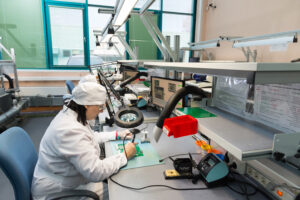A motor test bed is a specialized facility designed for testing and evaluating the performance, efficiency, and reliability of electric motors and propulsion systems.
These test beds provide a controlled en vironment where engineers and researchers can conduct experiments, simulate real-world conditions, and collect data to assess motor performance and validate design improvements.
vironment where engineers and researchers can conduct experiments, simulate real-world conditions, and collect data to assess motor performance and validate design improvements.
SAS (Smart Automation Solution) is a leading provider of analytics and business intelligence software, offering solutions for data management, analytics, and reporting across various industries. SAS experts possess specialized knowledge and expertise in leveraging SAS software to support motor test bed initiatives, enabling organizations to optimize testing processes, analyze results, and drive innovation in motor technology.
When collaborating with SAS experts on motor test bed projects, organizations can expect:
- Design and Development: SAS experts collaborate with organizations to design and develop motor test bed environments tailored to their specific needs and objectives.
This involves selecting appropriate instrumentation, control systems, and data acquisition tools to accurately measure motor performance parameters during testing. - Data Management and Analysis: SAS experts assist organizations in managing and analyzing data collected from motor test bed experiments.Advanced analytics techniques are applied to extract insights, identify patterns, and uncover correlations in the data, enabling organizations to make data-driven decisions and optimize motor designs and performance.
- Automation and Optimization: SAS experts leverage automation technologies to streamline motor test bed operations and optimize testing workflows.This may include implementing automated test scripts, scheduling test runs, and integrating test bed systems with other enterprise software applications for seamless data exchange and workflow automation.
- Performance Monitoring and Reporting: SAS experts develop monitoring and reporting solutions to track the performance of motors under test in real-time.Key performance indicators (KPIs) such as torque, speed, efficiency, and temperature are monitored, and reports are generated to provide stakeholders with visibility into motor performance and test outcomes.
- Fault Detection and Diagnostics: SAS experts deploy advanced analytics techniques to detect faults and anomalies in motor performance data and diagnose underlying issues.
By analyzing historical data and identifying abnormal patterns or deviations, organizations can preemptively address potential motor failures and optimize maintenance schedules to ensure maximum uptime and reliability.
Application Of Motor Test Bed:
- Automotive Industry: Motor test beds are extensively used in the automotive industry for testing and validating electric vehicle (EV) propulsion systems, including electric motors, motor controllers, and battery systems.
Manufacturers use test beds to assess motor performance, efficiency, torque characteristics, and thermal management under various driving conditions. - Aerospace and Defense: In the aerospace and defense sectors, motor test beds are used to evaluate the performance of propulsion systems for aircraft, unmanned aerial vehicles (UAVs), and other aerospace platforms.These test beds simulate flight conditions and assess motor reliability, power output, fuel efficiency, and responsiveness.
- Industrial Automation: Motor test beds play a crucial role in testing and optimizing electric motors used in industrial automation applications, such as robotics, manufacturing equipment, conveyor systems, and pumps.Manufacturers use test beds to validate motor performance, durability, and compatibility with control systems.
- Renewable Energy: Motor test beds are employed in the renewable energy sector for testing and validating wind turbine generators, hydroelectric generators, and other renewable energy systems.These test beds assess motor performance, power output, efficiency, and reliability under varying wind or water flow conditions.
- Consumer Electronics: In the consumer electronics industry, motor test beds are used to evaluate the performance of electric motors used in appliances, HVAC systems, power tools, and consumer electronics devices.Manufacturers use test beds to assess motor efficiency, noise levels, vibration, and durability.
- Research and Development: Motor test beds are valuable tools for research institutions and universities conducting studies on motor design, optimization, and performance enhancement.Researchers use test beds to investigate motor characteristics, develop new control algorithms, and explore innovative motor technologies.
- Energy Storage Systems: Motor test beds are utilized in testing energy storage systems, such as batteries and supercapacitors, for electric vehicles, renewable energy integration, and grid stabilization applications.Test beds assess the performance, efficiency, and cycle life of energy storage devices under different operating conditions.

